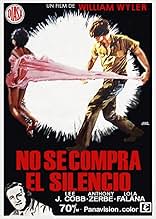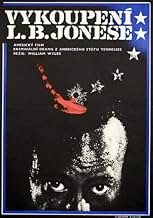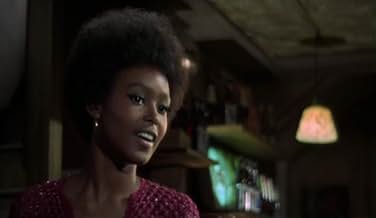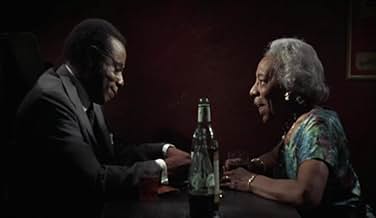Füge eine Handlung in deiner Sprache hinzuA successful African American businessman has a quarrel with a white policeman, suspecting that he is having an affair with his wife. The policeman's colleagues are seeking to avoid publicit... Alles lesenA successful African American businessman has a quarrel with a white policeman, suspecting that he is having an affair with his wife. The policeman's colleagues are seeking to avoid publicity.A successful African American businessman has a quarrel with a white policeman, suspecting that he is having an affair with his wife. The policeman's colleagues are seeking to avoid publicity.
- Auszeichnungen
- 1 Nominierung insgesamt
- Henry
- (as Joe Attles)
Empfohlene Bewertungen
Hollywood was just turning the corner in its presentation of dramatic material around 1970, with the revolutionary "The Graduate," "Bonnie & Clyde", and "Midnight Cowboy" already released, so Wyler's effort appears rooted to an earlier period in its presentation. Elmer Bernstein's music is bombastic and overly showy. The confining studios sets scream of the backlot environment "daring" pictures were then moving away from. And Wyler's static camera technique is a far cry from the fluid shots used by up 'n coming directors Penn, Nichols, Friedkin, and Wexler. But the overall tone and downbeat ending of "Jones" foreshadowed the de rigueur hard-edged storytelling that would make '70s pictures so vibrant.
Taking place in some jerkwater burg in Tennessee, the title character of L.B. Jones (played with dignified austerity by Roscoe Lee Browne) is a wealthy undertaker whose wife (the smoldering hussy embodied by Lola Falana) is practically rubbing his nose in her affair with a local cop. Jones wants to divorce her. The proceedings, if a courtroom action is necessary, would reveal her liaisons with the policeman, played by Anthony Zerbe, and Zerbe truly does not want his own wife to know of his infidelity. Thus, sets in motion the harrassment and tragedy of L.B.'s situation as only a town full of rednecks can perpetrate towards the threat of an intelligent, self-made African-American man.
Lee J. Cobb as the town's D.A. who always finds a way to help out the white folks, at the expense of blacks, walks a fine line of bigotry and self-discovery. It may be L.B.'s "liberation", but it's Cobb's character that will ultimately be put to a test. What's unique about this film is that he fails, miserably. Most movies made in the '80s and '90s about the racial plight of African-Americans, whether it be "Cry Freedom" or "Amistad" always have that knight in shining "white" armor that studios feel are needed to "help" the black man break the bonds of tyranny. The black character is never allowed to just gain freedom, discovery or triumph on the merits of his own strengths. This film has the guts to show L.B. take his "liberation" into his own hands, albeit with tragic results, and damns the white majority who are a long way from compassion and understanding.
The standout performance in the flick comes from Anthony Zerbe. If all you've seen are his scenery chewing in "Omega Man," his digit-dropping in "Papillon" or his head exploding in "License To Kill," check out his fully-fleshed out character of Willie Joe in this film. He embodies centuries of redneckdom in one person, portraying the self-inflated, unrepentent coward sheltered in police corruption so effectively that he masterfully overshadows the performances of everyone else onscreen. Unfortunately, Yaphet Kotto as a vengeful out of town visitor is given very little to do. And Barbara Hershey and Lee Majors barely have enough motivation to fill in their sketchy roles as Cobb's daughter and her altruistic lawyer husband.
If you can stand a little datedness to the narrative (and Elmer Bernstein's horrible score), take a look at this unflinching glimpse at an era of bigotry we thought was eradicated...but it's obviously not. My rating **1/2 out of ****.
The story is set in Tennessee and racism in this county is rampant. You will probably never find a movie that uses the 'n' word more...which I appreciate because it just shows how ugly racism is. The cops are evil perverters of women and justice and the place is NOT a place any black person would enjoy visiting...as they certainly would not have been welcome.
L. B. Jones happens to be the richest black man in the county and he is having problems with his wife. She's carrying on an affair with one of the cops and he's sick of it and wants a divorce. He seeks the help of a local lawyer (Lee J. Cobb) who at first refuses to take the case. But when his idealistic son-in-law shames him into taking it, he agrees...and spends much of the rest of the film perpetrating evil along with the local police department. What exactly did they do? See the film...but it certainly ain't nice!
The film came out after quite a few other race films had debuted and just before the big blacksploitation craze...so the timing was excellent. The film is brutal in the way it shows racism, as it's unflinching and will make you sick as you watch. This is a good thing...but a painful thing to see and hear. Well worth your time.
Wusstest du schon
- WissenswertesFinal film of director William Wyler.
- Zitate
Emma Jones: It going be something. I can't let nobody rob my baby and I can't let my baby enter this world without a dime!
- VerbindungenFeatured in Classified X (2007)
Top-Auswahl
Details
- Erscheinungsdatum
- Herkunftsland
- Sprache
- Auch bekannt als
- The Liberation of L.B. Jones
- Drehorte
- Humboldt, Tennessee, USA(location shooting - used for Somerton, Tenn.)
- Produktionsfirma
- Weitere beteiligte Unternehmen bei IMDbPro anzeigen
Box Office
- Budget
- 3.500.000 $ (geschätzt)
Zu dieser Seite beitragen




































